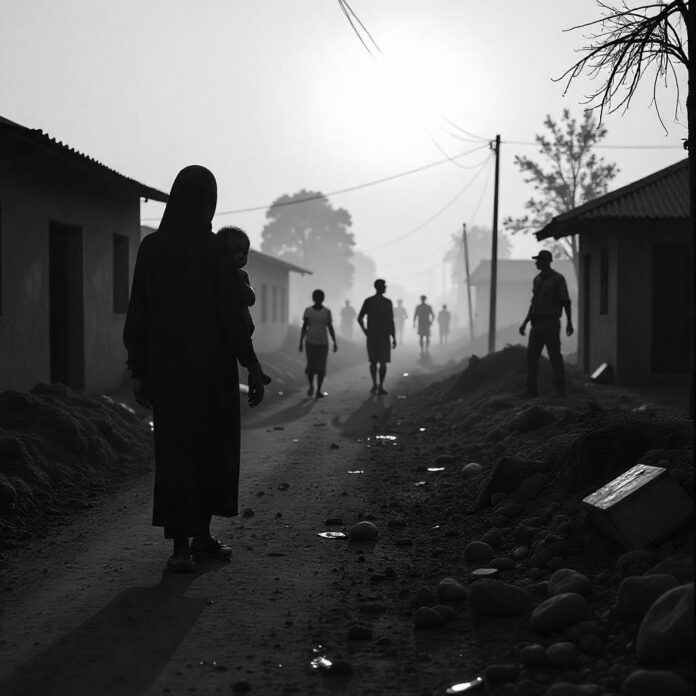On a single night in mid-June 2025, the quiet community of Yelewata in Benue State became the scene of unforgettable tragedy. Over 150 men, women, and children—many huddled in the local market, fleeing earlier unrest—were gunned down and burned alive in what survivors describe as senseless bloodletting. Amid charred homes and destroyed crops—years of harvest up in flames—witnesses recounted the unspeakable horror of losing entire families in that fateful night.
In response, President Bola Tinubu journeyed to Makurdi five days later, offering condolences, denouncing the atrocity, and calling for decisive action to bring perpetrators to justice. He publicly scolded law enforcement, asking why no arrests had been made—his words echoing nationwide frustration.
This article zeroes in on that moment—the presidential response to gang violence in North‑Central Nigeria—examining whether Tinubu’s directives signal true leadership or a reactive gesture. We unpack the roots of herder‑farmer conflict in the Middle Belt, dissect his immediate actions and challenges, compare them to previous interventions, and consider what comes next for communities like Yelewata.
Contextual Overview of the Incident
Late on Friday, June 13, 2025, the Yelewata community in Guma Local Government Area, Benue State, came under a nightmarish assault. Gunmen—believed to be Fulani herdsmen—surrounded the village and launched what survivors described as a multi‑hour onslaught, shooting sleeping families and setting ablaze their homes and the local market. The carnage left at least 150 people dead; bodies were found burned beyond recognition, many inside their houses or market stalls where they had sought refuge following earlier threats.
The market, once bustling with staple crops like rice and yam, was incinerated—destroying an entire year’s harvest in one night. For many residents, it was more than a livelihood; it was a lifeline. Its loss compounds an already crushing economic blow amid trauma and grief.
Survivors offer harrowing testimonies. One resident lost eight family members within four hours, describing the searing terror of watching them burned alive in their own homes. Another counted 20 family members among the dead—and watched helplessly as his stores of grain, clothing, and personal possessions went up in flames.
One man returned at dawn to bury his wife and four children, incinerated inside a market stall. Now displaced and traumatized, hundreds fear returning. Though local authorities have not officially named those responsible, the attack fits a brutal pattern of violence across Nigeria’s Middle Belt, where pastoralist herdsmen and farming communities vie for land and water.
Historical and Systemic Background
To understand the Yelewata massacre, we must trace its roots—what began as peaceful coexistence has evolved into relentless violence. Historically, Fulani herders and farming communities in Benue, Plateau, and surrounding areas maintained a symbiotic relationship, governed by negotiated grazing routes and mutual benefit.
Since the 1970s, desertification and shifting rainfall patterns forced herders southward, shrinking pastureland and disrupting traditional grazing practices. Rapid population growth and land consolidation by farmers further squeezed herders, eroding the space for shared land use.
Between 1997 and 2015, North‑Central Nigeria recorded roughly 371 farmer‑herder clashes—representing 95 percent of such violence nationwide. From 2001 to 2018, these clashes claimed about 60,000 lives and displaced over 300,000 people across Benue, Plateau, Nasarawa, and the Federal Capital Territory. A surge between 2016 and 2018 claimed over 3,600 lives.
Insecurity created space for criminal networks—bandits—who co-opted herder‑farmer flashpoints to carry out kidnappings, arson, and massacres. Bandit attacks in the North surged 731 percent between 2018 and 2022, marking a shift from communal tension to outright criminal warfare.
Governments have repeatedly failed to address root causes. Grazing corridors collapsed, ranching initiatives faltered, and anti‑open‑grazing laws—like Benue’s 2017 legislation—were poorly enforced. Impunity became entrenched: offenders rarely faced arrest or prosecution.
Benue has faced repeated horrors: the Agatu massacre in early 2016 claimed up to 500 lives and displaced thousands. Plateau state suffered coordinated massacres in 2022 and December 2023, each claiming 150 to 200 lives. What once were sporadic clashes have evolved into coordinated mass violence.
Tinubu’s Reaction: Immediate Measures
Crackdown Directive
On June 18, President Tinubu ordered security agencies to hunt down perpetrators and bring them to justice, declaring: “We will restore peace, rebuild, and bring the perpetrators to justice. You are not alone.” He publicly confronted law enforcement, demanding, “How come no arrest has been made? I expect there should be an arrest of those criminals.”
Symbolic Visit to Makurdi
Rather than visit Yelewata itself, Tinubu traveled to Makurdi—five days after the attack—to meet victims in hospital and community leaders, press for calm, and reaffirm federal solidarity.
Mandate for Reconciliation
On that same day, he directed federal and State House officials to support Governor Alia in convening reconciliation forums between herders and farmers—indicating a commitment to community-level healing alongside enforcement.
Government Backing and Messaging
Senator George Akume, the Secretary to the Government of the Federation, stated that “the days of bloodshed are numbered,” affirming federal resolve. Other ministers praised Tinubu’s prompt and decisive response, presenting a unified front in communication.
In summary, Tinubu’s immediate actions combined forceful directives, public solidarity, and community engagement. But how were these moves received?
Political and Civic Reaction
Despite Tinubu’s swift actions, political and civic backlash was immediate. Opposition leaders criticized his near‑24‑hour silence before public comment and five‑day wait for a visit—describing it as insensitive. Analysts warned that without arrests, his “decisive” statements risk reinforcing impunity.
Civil society members and local leaders expressed dismay that Tinubu visited Makurdi but skipped Yelewata, the epicenter of suffering. Politicians argued that empathy would have compelled him to go directly to victims in Yelewata.
Diaspora activists wrote open letters, calling the massacre a “silent genocide,” rejecting any framing as mere herder‑farmer reprisal. They urged genuine justice, compassion, and decisive leadership.
Governor Hyacinth Alia declared a statewide emergency, began enforcing anti‑open‑grazing laws, and called for a federal intervention fund. He vowed, “We will take the war to the doorsteps of those who bring war to us.”
While Tinubu’s directives earned cautious praise, his administration’s credibility remains under scrutiny.


